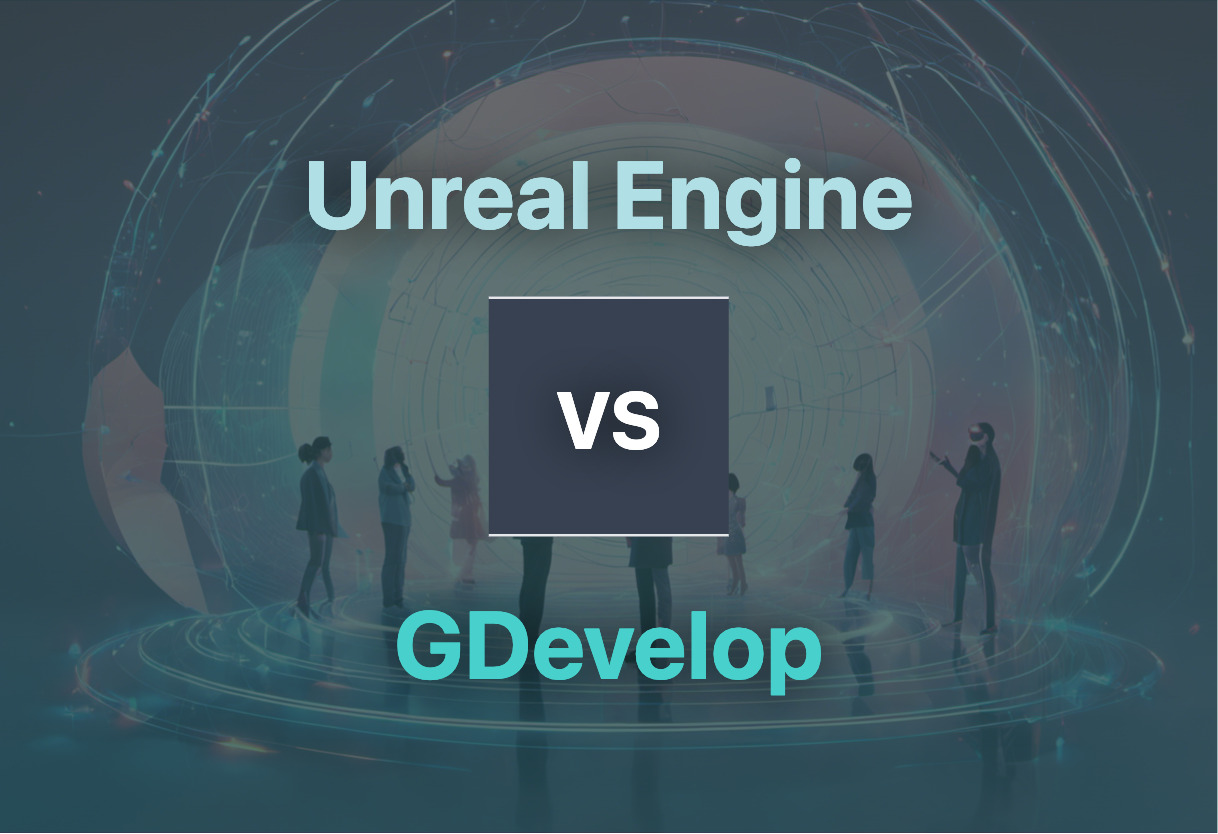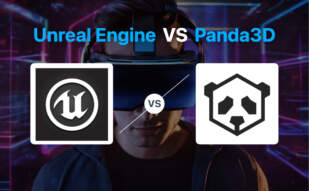If you’re in the game of extensive, high-quality 3D development requiring a robust toolset and don’t mind the C++ language, the Unreal Engine is your best bet. For those seeking a more beginner-friendly, codeless approach that offers cross-platform compatibility, GDevelop is the clear winner.

Key Differences Between Unreal Engine and GDevelop
- Coding: Unreal Engine utilizes C++, while GDevelop employs visual, event-based programming ideal for beginners.
- Revenue Model: GDevelop is entirely free while Unreal Engine charges 5% for revenues over $1M.
- Audience: GDevelop, being user-yielding, is beneficial for game design learning, whereas Unreal Engine provides a robust platform for industry-level 3D game development.
- Game Types: Unreal Engine is tailored for high-quality 3D games, whereas GDevelop is designed towards PC, mobile, and HTML5 games.
| Comparison | Unreal Engine | GDevelop |
|---|---|---|
| Developer | Epic Games | Florian Rival |
| Target Audience | Multi-genre game developers, film and TV industry | From non-programmers to experienced coders |
| Supported Platforms | Desktop, Mobile, Console, VR | Windows, MacOS, Linux, Web |
| Revenue Model | 5% of revenues over $1M (waived for Epic Game Store) | Free |
| Programming Ease | Basic project templates available | Event-based visual programming |
| Unique Features | Real-time geometry operations with UnrealEd | Users can modify almost anything |
| Community Contribution | Unreal Engine Marketplace | Contributions to development |
| Education Support | Free for schools and universities | Used in game education |
| Ease of Learning | Basic templates as starting points | Primarily intended for learners |
What Is Unreal Engine and Who’s It For?
Unreal Engine (UE) is a powerful, versatile series of 3D computer graphics game engines developed by Epic Games. Initially catered towards PC first-person shooters, UE has since expanded its influence, permeating various genres and industries, including film and television. With its powerful and flexible features, UE is crafted for a wide array of users – from solo developers to large production studios, and even non-gaming industries looking to harness the possibilities of real-time 3D content.

Pros of Unreal Engine
- Comprehensive and powerful platform supporting a multitude of game genres and industries
- Supports a range of platforms, thus allowing for extensive creative freedom
- Active marketplace, offering a revenue share of 88% to content creators
- Free to use for schools and universities
Cons of Unreal Engine
- Can be intimidating for beginners owing to its complex and extensive features
- Epic Games charges 5% of revenues over $1 million for commercial use
- Being a robust engine, it requires more system resources
What Is GDevelop and Who’s It For?
GDevelop, developed by Google software engineer Florian Rival, is an open-source, cross-platform game engine primarily designed for creating PC, mobile, and HTML5 games. This user-friendly platform is perfect for individuals at all levels, from novices testing their development chops to experienced coders seeking a versatile engine for their inventive ideas. Besides game enthusiasts, GDevelop is also well-suited for educational institutions teaching game design tools and techniques.

Pros of GDevelop
- Easily accessible to both beginners and seasoned programmers
- Offers an intuitive, event-based system for creating game logic
- Advanced features for crafting 3D graphics and animations
- Totally free to use with options to monetize games
Cons of GDevelop
- While it offers open-source capabilities, inexperienced users may find it complex to modify
- Advanced users could face slower development and decreased stability
- Lacks the broad industrial applicability of some other engines
Unreal Engine vs GDevelop: Pricing
While Unreal Engine utilizes a royalty-based pricing model contingent on revenue, GDevelop offers a completely free model.
Unreal Engine
Unreal Engine, developed by Epic Games, adopts a royalty-based pricing model for commercial usage. Epic charges 5% of revenues over USD 1 million. The fee is waived for games published on the Epic Games Store. As of March 2015, Unreal Engine 4 became free for all users conditionally, charging a 5% fee on product revenues exceeding $3,000 per quarter. It is also free for educational institutions like schools and universities.
GDevelop
GDevelop, a project supported by Florian Rival from Google, operates on an entirely open-source and free platform. The engine focuses on promoting learning game design tools and techniques, available for learners at all levels. Its freemium structure contrasts with similar software like Construct 3, which demands a licensing fee. All games created with GDevelop can be monetized without any imposed financial restrictions.
Code Examples for Unreal Engine & GDevelop
Unreal Engine
Exploring the power of Unreal Engine, this code snippet will reveal how to change the light color of a point light actor in the scene, from inside an actor’s script! Make sure you have PointLightActor present in the scene.
// Include PointLight Component Header
#include "Components/PointLightComponent.h"
// Function to change light color
void AYourActor::ChangeLightColor(FLinearColor NewColor)
{
// Try and find our light by its name
AActor* PointLightActor = FindObject<aactor>(ANY_PACKAGE, TEXT("PointLightActor"));
// If we found it, then change its color
if(PointLightActor)
{
UPointLightComponent* PointLight = PointLightActor->FindComponentByClass<upointlightcomponent>();
if(PointLight)
{
PointLight->SetLightColor(NewColor);
}
}
}
</upointlightcomponent></aactor>GDevelop
In this GDevelop snippet, we delve into sprite animation transitions. The below piece of code makes a game character run and jump. Note: have your ‘PlatformerObject’ and scene prepped.
// Create variables
var player = runtimeScene.getObjects("PlatformerObject")[0];
var animation = player.getAnimation();
// Set player running animation
if (gdjs.evtTools.input.isKeyPressed(runtimeScene, "Right")) {
player.setAnimation(1);
}
// Set player jumping animation
else if (gdjs.evtTools.input.isKeyPressed(runtimeScene, "Up")) {
player.setAnimation(2);
}
// Reset to idle animation
else {
player.setAnimation(0);
}Deciding Between Reality and Virtuality: Unreal Engine vs GDevelop
When it comes to game development, choosing an engine is as crucial as designing a level or scripting an event. Through a detailed examination of Unreal Engine and GDevelop, we bring you a definitive verdict.
Experienced Developers with Commercial Intentions
For seasoned coders eyeing high-tech and possibly commercial projects, Unreal Engine stands as the superior choice. Its thorough C++ platform (with Unreal Engine 5 arriving in April 2022), vast array of supported platforms such as desktop, mobile or VR, and the chance to benefit from an 88% share of revenue generated from the Unreal Engine Marketplace, all make it a lucrative choice. Furthermore, the royalty fee is waived for games published on the Epic Games Store, providing further incentive to commercially orientated developers.

Budding Game Design Students
For novice designers and students, GDevelop offers a welcoming playground. As an open-source engine focusing on PC, mobile, and HTML5 games, GDevelop provides an intuitive, event-based visual programming environment. It smoothly adapts to varying skill levels, making it an excellent stepping stone for students wishing to grasp game design tools, techniques, and terminology.

Modders and Indie Developers
Unreal Engine and GDevelop cater to different factions within this audience. Modders can enjoy exploring Unreal Engine 3’s openness and Unreal Development Kit’s extension for creating iOS games and apps. On the other hand, indie developers who appreciate flexibility, freedom, and the option to create without coding would find GDevelop’s extension options and cross-platform compatibility more suited to their needs.

If sifted for complexity and sophistication, Unreal Engine emerges as a better choice for seasoned developers aiming for commercial success. GDevelop, with its result-oriented visual programming, acts as a fertile learning ground for those starting their game development journey.
Patrick Daugherty
Content writer @ Aircada. Merging AR expertise with a love for late-night gaming sessions.





